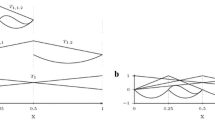Abstract
A family ηα, α∈[0,1], of residual-based error indicators for the hp-version of the finite element method is presented and analyzed. Upper and lower bounds for the error indicators ηα are established. To do so, the well-known Clément/Scott–Zhang interpolation operator is generalized to the hp-context and new polynomial inverse estimates are presented. An hp-adaptive strategy is proposed. Numerical examples illustrate the performance of the error indicators and the adaptive strategy.
Similar content being viewed by others
References
M. Ainsworth and T.J. Oden, A procedure for a posteriori error estimation for hp finite element methods, Comput. Methods Appl. Mech. Engrg. 101 (1992) 73–96.
M. Ainsworth and T.J. Oden, A Posteriori Error Estimation in Finite Element Analysis (Wiley, New York, 2000).
M. Ainsworth and B. Senior, Aspects of an adaptive hp-finite element method: Adaptive strategy, conforming approximation and efficient solvers, Comput. Methods Appl. Mech. Engrg. 150 (1997) 65–87.
M. Ainsworth and B. Senior, An adaptive refinement strategy for hp-finite-element computations, Appl. Numer. Math. 26 (1998) 165–178.
M. Ainsworth and B. Senior, hp-finite element procedures on non-uniform geometric meshes, in: Grid Generation and Adaptive Algorithms, eds. M. Bern, J. Flaherty and M. Luskin, The IMA Volumes in Mathematics and its Applications, Vol. 113 (Springer, New York, 1999) pp. 1–27.
I. Babuška and T. Strouboulis, The Finite Element Method and its Reliability (Oxford Univ. Press, Oxford, 2001).
I. Babuška, T. Strouboulis and S.K. Gangaraj, Guaranteed computable bounds for the exact error in the finite element solution. I: One-dimensional model problem, Comput.Methods Appl.Mech. Engrg. 176 (1999) 51–79.
C. Bernardi, Indicateurs d'erreur en h-N version des éléments spectraux, Math. Modelling Numer. Anal. 30(1) (1996) 1–38.
C. Bernardi and Y. Maday, Spectral methods, in: Handbook of Numerical Analysis, Vol. 5, eds. P.G. Ciarlet and J.L. Lions (North-Holland, Amsterdam, 1997).
C. Bernardi, R.G. Owens and J. Valenciano, An error indicator for mortar element solutions to the Stokes problem, IMA J. Numer. Anal. 21 (2001) 857–886.
Ph. Clément, Approximation by finite element functions using local regularization, RAIRO Anal. Numérique 9 (1975) 77–84.
D. Dunavant and B. Szabó, A posteriori error indicators for the p-version of the finite element method, Internat. J. Numer. Methods Engrg. 19 (1983) 1851–1870.
C. Lage, Concept oriented design of numerical software, Technical Report 98–07, Seminar für Angewandte Mathematik, ETH Zürich (1998).
J.M. Melenk and B.I.Wohlmuth, On residual-based a posteriori error estimation in hp-FEM, Technical Report 436, Math.-Nat. Fakultät, Universität Augsburg, Augsburg, Germany (2001).
J.T. Oden, W. Wu and M. Ainsworth, Three-step hp adaptive strategy for the incompressible Navier-Stokes equations, in: Modeling, Mesh Generation, and Adaptive Numerical Methods for Partial Differential Equations, eds. I. Babuška, J. Flaherty, W. Henshaw, J. Hopcroft, J. Oliger and T. Tezduyar (Springer, Berlin, 1995) pp. 347–366.
T.J. Oden, L. Demkowicz, W. Rachowicz and T.A. Westermann, Towards a universal hp finite element strategy. Part 2. A posteriori error estimation, Comput. Methods Appl. Mech. Engrg. 77 (1989) 113–180.
T.J. Oden, A. Patra and Y.S. Feng, An hp adaptive strategy, in: Adaptive, Multilevel and Hierarchical Computational Strategies, ed. A.K. Noor (ASME, New York, 1993) pp. 23–46.
C. Schwab, p-and hp-Finite Element Methods (Oxford Univ. Press, Oxford, 1998).
L.R. Scott and S. Zhang, Finite element interpolation of nonsmooth functions satisfying boundary conditions, Math. Comp. 54 (1990) 483–493.
B. Szabó and I. Babuška, Finite Element Analysis (Wiley, New York, 1991).
R. Verfürth, A Review of a Posteriori Error Estimation and Adaptive Mesh Refinement Techniques (Teubner/Wiley, 1996).
Author information
Authors and Affiliations
Rights and permissions
About this article
Cite this article
Melenk, J., Wohlmuth, B. On residual-based a posteriori error estimation in hp-FEM. Advances in Computational Mathematics 15, 311–331 (2001). https://doi.org/10.1023/A:1014268310921
Issue Date:
DOI: https://doi.org/10.1023/A:1014268310921




